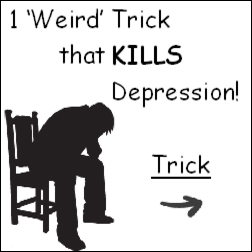|
|
Yes, it is possible that you can fight mild depression without the use of drugs, without tricks, without feeling weak or hopeless and beat it. It happens everyday.
Over two thousand years ago, Epictetus, (1st and early 2nd centuries C.E.), a philosopher in ancient Greece, proclaimed that “men are disturbed not by events, but by the views which they take of them.” This became the basis for Rational Emotive Behavior Therapy (REBT) formulated by the late Dr. Albert Ellis in 1955. Dr. Ellis asserted that a person’s experiences do not cause a specific emotional reaction; rather it is the person’s own belief system that produces the reaction.
Irrational Thinking
One important key element is the word rational. Dr. Ellis believed that the majority of long standing emotional problems are almost always due to irrational thinking, and drawing extreme conclusions – especially negative ones about an event. What we are writing about are extreme, illogical, damaging and self-sabotaging beliefs that cause unhealthy emotional consequences.
Irrational thinking is usually “black and white,” “all-or-nothing” and filled with negative language of “shoulds” and “I can’ts” that prevent the possibility of alternative, positive experiences like “hang on, I’m looking at this all wrong” or “I can do this.”
Allowing Room for Optimism
Rational thinking creates the exact opposite effect. It is based on tolerance and the ability to bear distress without coming to catastrophic negative conclusions. Obviously bad things happen. Rational thinking acknowledges reasonable feelings of guilt, sadness and frustration. But there is always the possibility of a better day and one should always allow room for optimism.
Path to Enlightenment
Just as the ancient Greek philosophers understood “imbalances” and “temperaments,” so did Gautama Buddha. More than 2,500 years ago he taught that suffering is caused by desire, and can be alleviated by releasing that desire. That right Mindfulness is the seventh step of the eightfold path to enlightenment and to end suffering.
You Are Not Your Mind
The goal of Mindfulness is to be nonjudgemental, engaged, connected, aware, to live only in the moment, and accepting without judging. Most importantly, to completely understand that you are not your mind.
With Mindfulness we learn to observe and identify our thoughts calmly, in a detached and decentralized way. To realize that our minds have a life of their own. Trust enough in yourself to understand that a thought of failure, for example, is simply to be seen as an event in the mind, not as a spring board to the assumption that you are a failure.
With practice we can begin to understand and view the body and mind as one thing, a wholeness. Each of us is more than just a body and more than the thoughts that go through our mind. This is central to eastern philosophies, according to Jon Kabat-Zinn.
Thinking on the Past
It is important to understand that obsessing about your thoughts and feelings may cause far more harm than good. Naturally you want to gain some insight, but that can easily devolve into self-judging and almost always involves thoughts of the past. Only humans can think about the past. This allows us to learn from our past experiences of course. Ah, if we could just go back and do that over again knowing what we know today. But we can’t and that will be the end of that thought. For if we continue thinking in our past we will: judge ourselves harshly, immerse ourselves in guilt, be filled with self-blame, self-loathing and resentment and self-pity. What good will any of that achieve? Nothing what-so-ever.
Or the Future
And only humans can think of the future. Certainly it is a wise person who makes plans for the future and we all should. Similarly thoughts about the future can quickly move to doubt, about endless possibilities, causing dread, fear, worry, stress, anxiety and hopelessness. Your thoughts begin to make you think you are a loser. Because of an imaginary failure in your future, you think you will always be a loser. I hope you can see where this is going?
Your guilt-ridden thoughts about your past creep into your present. Then your hopeless thoughts about your bleak future ruin your present. And there we are all curled up in a ball in the corner of the room.
Mindfulness Is Key
Mindfulness eliminates all these thoughts of failure and “what-ifs” by planting you firmly in the present, letting all those negative thoughts float right on by. How? Because you are not your thoughts. And, you are in control.
Buddha told us that to end suffering we must know Mindfulness, to learn to be nonjudgemental especially with ourselves. Acceptance gives us the ability to deal with whatever comes our way, including feeling sad or depressed. Accepting what is, often clears the mind. Acceptance opens up the possibility for optimism, alternatives and the possibility of a better day.
This report is not a diagnosis. We hope this information can guide you toward improving your life.
Review our Knowledge Base or the links displayed on this page for similar and related topics.


